|
|
|
Sort Order |
|
|
|
Items / Page
|
|
|
|
|
|
|
| Srl | Item |
| 1 |
ID:
091802
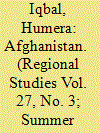

|
|
|
|
|
| Publication |
2009.
|
| Summary/Abstract |
Many problems that Afghanistan faces today are rooted in the legacy of its relationship with the international community. Weaknesses in governance, poor institution-building, absence of democracy, problems relating to its role in the war against terror and lack of accountability in foreign aid usage are some.
|
|
|
|
|
|
|
|
|
|
|
|
|
|
|
|
| 2 |
ID:
098648
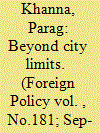

|
|
|
| 3 |
ID:
187503
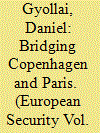

|
|
|
|
|
| Summary/Abstract |
Integrating the discursive and practice-based approach to securitisation, this article explores how the police function as the audience of securitising discourse. Taking the Hungarian case of border control, it looks into how the police accept and buy into anti-immigrant discourses of the political elite. Based on a questionnaire survey of Hungarian police officers, it demonstrates the potential of discursive legitimation in shaping officers’ understanding of mass migration. It describes the ways in which attitudes and hence, arguably, practice can be conditioned by securitising discourse. The overall aim of the article is to advance the understanding of the narrative dimension of power struggles between police and the political elite, and how that structures the field of border security. Critical security scholars have pointed out that police filter securitising discourse based on their professional dispositions and preferences. However, the Hungarian case seems to suggest that discourse may, in fact, influence dispositions themselves.
|
|
|
|
|
|
|
|
|
|
|
|
|
|
|
|
| 4 |
ID:
111818
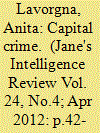

|
|
|
| 5 |
ID:
144615


|
|
|
|
|
| Summary/Abstract |
As the UN Climate Change Conference in Paris came to a close in December 2015, foreign ministers from around the world raised their arms in triumph. Indeed, there was more to celebrate [1] in Paris than at any prior climate summit. Before the conference, over 180 countries had submitted detailed plans to curb their greenhouse gas emissions. And after two weeks of intense negotiation [2], 195 countries agreed to submit new, stronger plans every five years.
|
|
|
|
|
|
|
|
|
|
|
|
|
|
|
|
| 6 |
ID:
081838
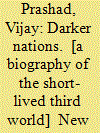

|
|
|
|
|
| Publication |
New Delhi, LeftWord Books, 2007.
|
| Description |
382p.Hbk
|
| Standard Number |
9788187496663
|
|
|
|
|
|
|
|
|
|
|
|
Copies: C:1/I:0,R:0,Q:0
Circulation
| Accession# | Call# | Current Location | Status | Policy | Location |
| 053503 | 909.09724/PRA 053503 | Main | On Shelf | General | |
|
|
|
|
| 7 |
ID:
114997


|
|
|
|
|
| Publication |
2011.
|
| Summary/Abstract |
In the April 2010 Review of International Studies, Roland Paris argued that liberal peacebuilding is the only viable solution for rebuilding war-torn societies, and supported this by assailing critics of the liberal peace. In this article we challenge four key claims made by Paris: imposed and consensual peacebuilding are different experiences; there are no echoes of imperialism in modern peacebuilding; there is no alternative to the capitalist free market; and critics of the liberal peace are 'closet liberals'. We argue that Paris ignores the extent to which all peacebuilding strategies have had a core of common prescriptions: neoliberal policies of open markets, privatisation and fiscal restraint, and governance policies focused on enhancing instruments of state coercion and 'capacity building' - policies that have proved remarkably resilient even while the democracy and human rights components of the liberal peace have been substantially downgraded. There is little space to (formally) dissent from these policy prescriptions - whether international peacebuilders were originally invited in or not. Furthermore, the deterministic assumption by Paris that 'there is no alternative' is unjustifiable. Rather than trying to imagine competing meta-alternatives to liberalism, it is more constructive to acknowledge and investigate the variety of political economies in post-conflict societies rather than measuring them against a liberal norm.
|
|
|
|
|
|
|
|
|
|
|
|
|
|
|
|
| 8 |
ID:
119400
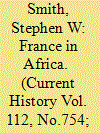

|
|
|
|
|
| Publication |
2013.
|
| Summary/Abstract |
Long gone . . . is the inbred elite connivance between Paris and the francophone capitals in Africa.
|
|
|
|
|
|
|
|
|
|
|
|
|
|
|
|
| 9 |
ID:
119879
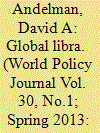

|
|
|
|
|
| Publication |
2013.
|
| Summary/Abstract |
Paris-As a New Year's gift to those who elected him, France's new president, François Hollande, mired in a seemingly intractable economic malaise and about to embark on a war in an old colonial territory of Francophone Africa, made an announcement, which the French daily Le Monde carried as an urgent bulletin. He would put an end to the practice of every ex-president becoming a member of the Conseil Constitutionnel, the final judicial appeal of French citizens. Beginning with himself, though not extending to his hated predecessor, Nicolas Sarkozy, no exiting president would have the inalienable right to a seat on France's highest court. It was a campaign promise, one of 60 that Hollande made, as French presidents are wont to make in the heat of battle but rarely expected to remember, let alone keep. But Hollande has been quite meticulous in honoring a number of them. Still, of the 60 pledges, only two had anything to do with France's hidebound judiciary that has changed little since the Napoleonic Code was established not long after the absolute monarchy was ended by the French Revolution. Even today, in a French court, a defendant who arrives there has already been judged by a juge d'instruction, who is both investigator and judge, and must prove his or her innocence. And while one of Hollande's pledges calls for "suppression of peines-plancher," or unyielding minimum sentences, even this still awaits legislative action.
|
|
|
|
|
|
|
|
|
|
|
|
|
|
|
|
| 10 |
ID:
177700
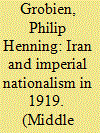

|
|
|
|
|
| Summary/Abstract |
Interposed between the Constitutional Revolution and the rise of Reza Khan, Iran began a foreign diplomacy that asserted a nuanced nationalism. After the devastation of the First World War, Iran sent a commission to the Peace of Paris. There, Iran put forward a nationalist programme which sought a sovereign and independent Iran, and the return of territory lost since 1828. Whilst many facets in this nationalist programme had been articulated before 1919, it is the consolidation within one programme which makes this programme unusual. It was also the first time such a great number of specific territorial claims were made. This imperial nationalism, requires an assessment within the narrative of Iranian nationalism, and will be explored in this article.
|
|
|
|
|
|
|
|
|
|
|
|
|
|
|
|
| 11 |
ID:
105654
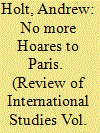

|
|
|
|
|
| Publication |
2011.
|
| Summary/Abstract |
Italy's invasion of Abyssinia in October 1935 prompted a major European crisis. This article applies the main theories of foreign policy analysis to the British Government's handling of this crisis. It argues that bureaucratic politics existed, but had little impact on outcomes. Domestic politics had more influence, but did not provide detailed instructions on how to act. The perceptions of key actors, informed by reasoned judgement, determined this. Fears of the threat posed by rival states coalesced with concerns about Britain's own military weakness, leading decision-makers to emphasise the need to act in tandem with France. British policy was therefore motivated by the tension between the public's desire to see action against Italy and the Government's wish to minimise any breach with her allies. These findings highlight the weaknesses of the bureaucratic politics model and show how domestic politics can affect foreign policy outcomes. They also demonstrate the interaction between rational analysis defined in terms of reasoned judgement, and actors' perceptions. It is thus argued that benefits are to be gleaned from combining these theories.
|
|
|
|
|
|
|
|
|
|
|
|
|
|
|
|
| 12 |
ID:
119736
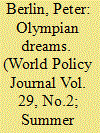

|
|
|
|
|
| Publication |
2012.
|
| Summary/Abstract |
Paris-When the gun sounds on the evening of August 4 to set the fastest men in the world surging down the track at the Olympic Stadium in London, much of the world will be watching. For the shrinking, but still significant, slice of population that remains immune to the increasingly pervasive global reach of sport, the question is: Why? There are those who cannot understand, may even distrust, competitiveness in adults. Others question the resources-time, energy, and, above all, money-dedicated to modern sports, particularly the great set-piece events like the Olympics or the soccer World Cup.
|
|
|
|
|
|
|
|
|
|
|
|
|
|
|
|
| 13 |
ID:
149825
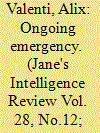

|
|
|
|
|
| Summary/Abstract |
Ahead of the second anniversary on 7 January 2017 of the Charlie Hebdo attack in Paris, Alix Valenti surveys how well a comprehensive reorganisation of the French security apparatus, amid growing police discontent, has addressed rising security threats.
|
|
|
|
|
|
|
|
|
|
|
|
|
|
|
|
| 14 |
ID:
112102
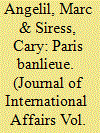

|
|
|
|
|
| Publication |
2012.
|
| Summary/Abstract |
Debates on contemporary urban conditions often center on the periphery of the city where an ever-increasing proportion of the urban population is forced to live. This article focuses on the banlieue-the periphery of Paris-as a model for the breakdown of the spatial order in cities globally. We examine how France's urban planning, guided by political and economic influences, has created and sustained banlieue poverty and marginalization. With rising anxieties about civil disorder in Paris resulting from the spatial inequities and cultural stigma toward the banlieue, it is now generally agreed that the city's historical planning policies have failed. We argue that any attempt to allocate space within a city equitably cannot emanate from the city center alone, but must also come from the marginalized periphery, which is equally a part of the system.
|
|
|
|
|
|
|
|
|
|
|
|
|
|
|
|
| 15 |
ID:
153335
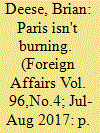

|
|
|
| 16 |
ID:
175721


|
|
|
|
|
| Summary/Abstract |
This essay uses the official reports as well as sources from the intelligence services to provide a clearer picture of the working circumstances of the Belgian intelligence and security services and the pressure they were under to deal with the challenges posed by violent radicalisation and terrorist plots since the emergence of the foreign fighters phenomenon. It will be shown how mounting pressure from the rapidly expanding threat exacerbated the gradual exhaustion of the security services by structural issues of unaddressed organisational difficulties, and budget restrictions faced with increasing workloads. Due to the high number of foreign fighters, belated initiatives taken to assess the threat were impeded by barriers to information exchange, unclear guidance, and data overload. The failure of Belgian intelligence to detect the attack plans was more a symptom of policy failure than the underachievement of the services. A concluding section will reflect upon the inadequacy and lateness of policy responses because of a Belgian tendency to understate security.
|
|
|
|
|
|
|
|
|
|
|
|
|
|
|
|
| 17 |
ID:
125222
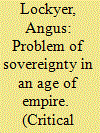

|
|
|
|
|
| Publication |
2013.
|
| Summary/Abstract |
ABSTRACT: This article examines a confrontation at the Exposition Universelle in Paris in 1867 between the Tokugawa shogunate and the domain of Satsuma. The confrontation was provoked by the latter, which used its control over the Ryukyu Islands, the services of a minor Franco-Belgian nobleman, and the opportunity of the international exhibition to demonstrate its independence from and equality to the shogunate. The episode was incidental to the collapse of the Tokugawa state later that year, but is a useful microcosm through which to understand the relationship between domestic considerations and international relations in the constitution of the modern state. Most accounts of modern Japan tend to be premised on the normative status of the latter, both as a natural container within which the early modern elements of the archipelago could be alchemized and as a soon-to-be sovereign actor on the international stage. This article argues, however, that this assumption is problematic. By the 1860s the order was clearly inadequate to the demands of the international system. The Meiji state, however, remained vulnerable to these, in ways the events in Paris suggest. The shogunate's difficulties underline the effort necessary to create the appearance of sovereignty, but also the extent to which its assertion and recognition is subject less to professed norms of equality and independence than the consequences of interest, industry, and empire. As such, it becomes clear that sovereignty can disrupt as much as it can clarify, undermining the order it seems to promise.
|
|
|
|
|
|
|
|
|
|
|
|
|
|
|
|
| 18 |
ID:
119732
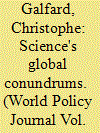

|
|
|
|
|
| Publication |
2011.
|
| Summary/Abstract |
PARIS-Extremophiles thrive in the bubbling acidic springs of Yellowstone, in ocean beds miles below the sea surface, and in the radioactive pools of nuclear power plants. They flourish in places so hostile that any other living being would be crushed, dissolved, or melted within seconds. These tiny organisms were discovered during the second half of the 20th century, and today they happen to be Patrick Forterre's passion. Professor Forterre works at the Pasteur Institute, named after Louis Pasteur, the 19th century French scientist who fathered what we now call microbiology and who discovered, among other breakthroughs, the vaccines for anthrax and rabies and the pasteurization process.
|
|
|
|
|
|
|
|
|
|
|
|
|
|
|
|
| 19 |
ID:
129071
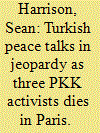

|
|
|
|
|
|
|
|